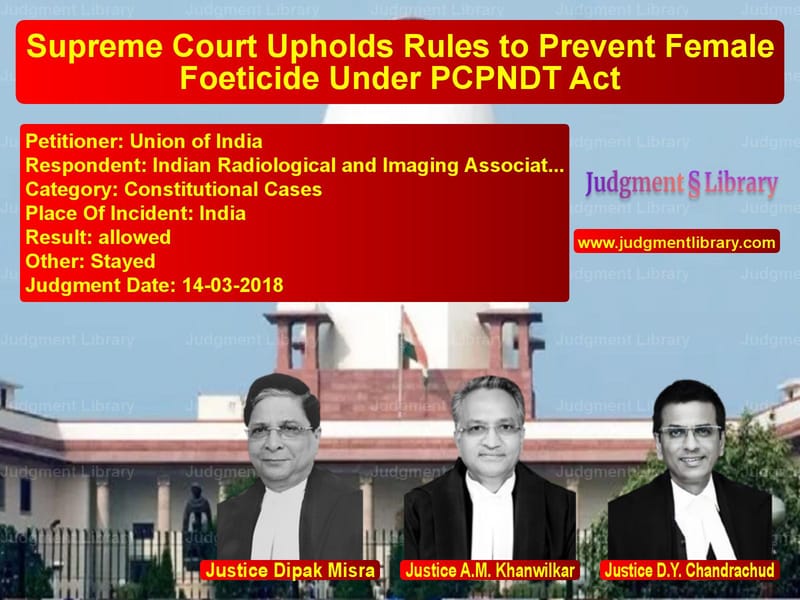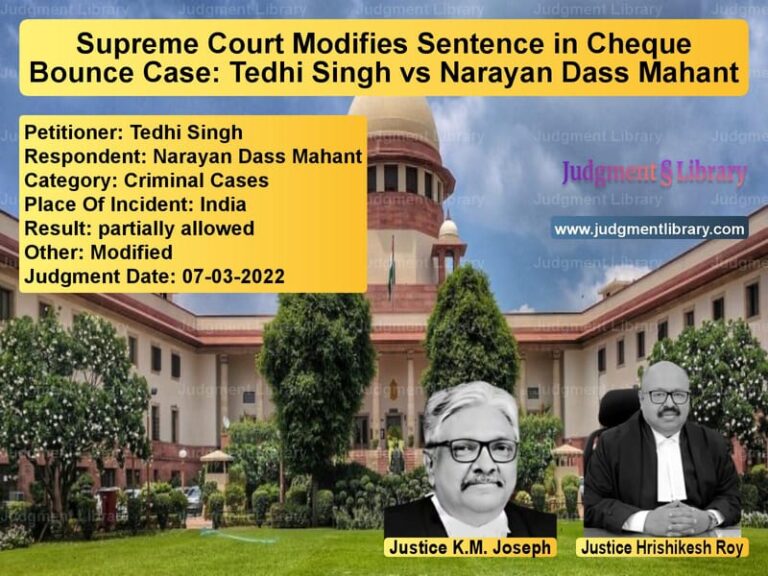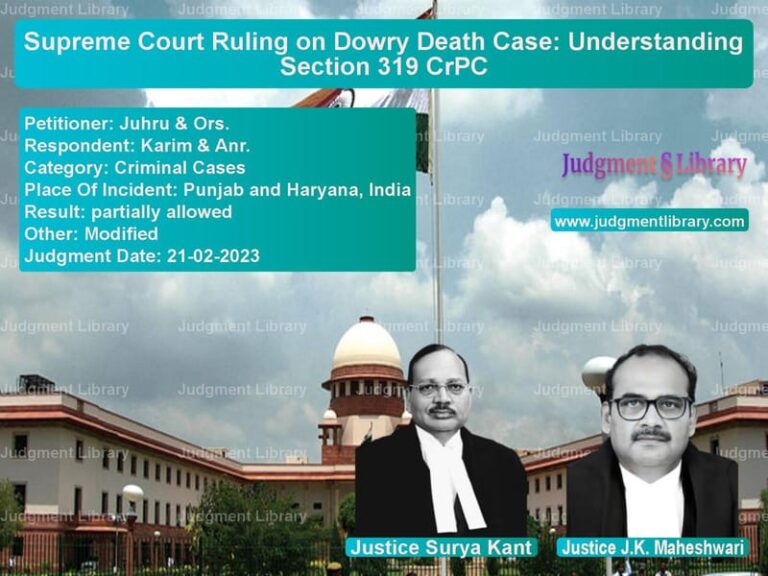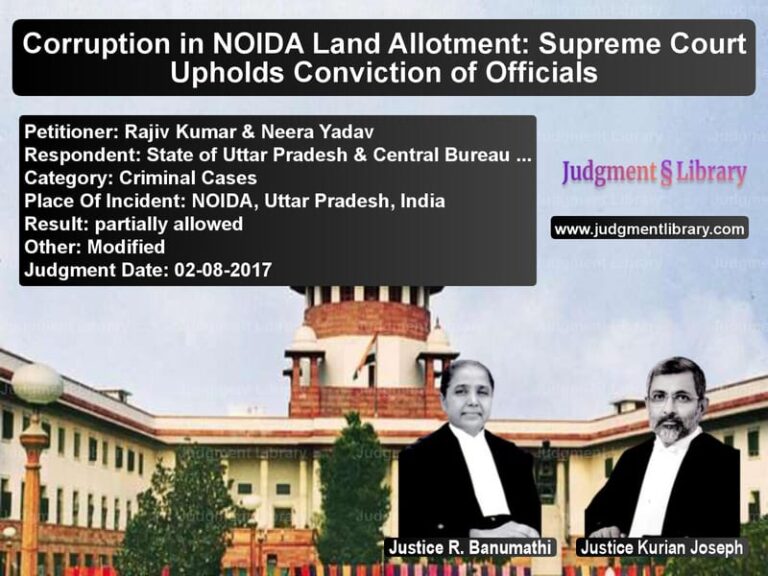Supreme Court Upholds Rules to Prevent Female Foeticide Under PCPNDT Act
The case of Union of India vs. Indian Radiological and Imaging Association is a landmark judgment concerning the implementation of the Pre-Conception and Pre-Natal Diagnostic Techniques (Prohibition of Sex Selection) Act, 1994 (PCPNDT Act). The Supreme Court upheld the government’s regulations requiring six months of mandatory training for medical professionals conducting ultrasound procedures and stayed a Delhi High Court ruling that had struck down parts of the Act.
This ruling reinforces India’s commitment to curbing female foeticide and ensuring strict regulation of pre-natal diagnostic procedures.
Background of the Case
The PCPNDT Act was enacted to prevent sex-selective abortions and regulate the use of pre-natal diagnostic techniques. Over the years, concerns were raised regarding the ineffective enforcement of the Act, leading the Supreme Court to issue multiple directions in Voluntary Health Association of Punjab vs. Union of India (2016).
Following this, the Central Government introduced the PCPNDT (Six Months Training) Rules, 2014, mandating training for medical practitioners performing ultrasonography. This led to a challenge before the Delhi High Court by the Indian Radiological and Imaging Association (IRIA), which questioned the validity of these rules.
The Delhi High Court, in its judgment dated February 17, 2016, ruled that the training requirements were beyond the scope of the PCPNDT Act and struck down certain provisions. The Union of India appealed against this decision before the Supreme Court.
Petitioner’s Claims (Union of India)
The Union of India argued:
- The six-month training requirement was essential to ensure that medical practitioners understood the objectives of the PCPNDT Act and were equipped to prevent its misuse.
- The Delhi High Court had overstepped its jurisdiction by striking down the training requirements, which were framed to curb the misuse of ultrasound technology for sex determination.
- The Supreme Court had already issued directions in Voluntary Health Association of Punjab, which mandated stricter enforcement of the Act.
Respondent’s Claims (Indian Radiological and Imaging Association)
The IRIA contended:
- The government had no authority to impose training requirements through subordinate legislation under the PCPNDT Act.
- The rules affected existing medical practitioners who had been performing ultrasounds for years without any prior training.
- The regulation of medical qualifications fell within the ambit of the Medical Council of India (MCI), not the PCPNDT Act.
Supreme Court’s Observations
The Supreme Court analyzed the legislative intent of the PCPNDT Act and found that Parliament had empowered the government to frame rules ensuring effective implementation. The Court stated:
“Parliament has conferred upon the Central government rule-making authority to specify the minimum qualification for persons employed at genetic counseling centers, laboratories, and clinics.”
It further observed:
“Even on a plain and natural construction of the words used by Parliament, specification of qualifications must necessarily comprehend the power to prescribe training.”
The Court emphasized that the purpose of the training was to sensitize practitioners to the provisions of the Act and prevent misuse of pre-natal diagnostic technology.
Key Findings of the Supreme Court
- The Delhi High Court erred in striking down the training requirements under the PCPNDT Act.
- The government has the authority to prescribe training requirements to ensure compliance with the Act’s objectives.
- The six-month training rule was a necessary safeguard to prevent sex-selective abortions and ensure ethical medical practices.
- The Supreme Court’s 2016 ruling in Voluntary Health Association of Punjab provided clear directives on strict implementation, which must be followed.
Final Judgment
The Supreme Court ruled:
- The appeal by the Union of India was allowed.
- The Delhi High Court’s judgment was stayed.
- All states and union territories were directed to enforce the PCPNDT Act and its rules strictly.
- The six-month training requirement for medical practitioners performing ultrasounds was upheld.
Key Takeaways from the Judgment
- Strengthening the PCPNDT Act: The ruling reinforces the government’s authority to frame rules ensuring strict compliance with the law.
- Judicial Support for Gender Justice: The Court upheld measures aimed at preventing female foeticide and protecting the rights of the girl child.
- Mandatory Training for Compliance: Medical professionals conducting ultrasounds must undergo the prescribed training to prevent misuse of the technology.
- Role of the Supreme Court in Policy Implementation: The judgment ensures that High Court rulings do not undermine the objectives of central legislation.
Conclusion
This landmark ruling safeguards the integrity of the PCPNDT Act, ensuring that medical professionals are well-trained in its provisions and objectives. By staying the Delhi High Court’s order, the Supreme Court reaffirmed its commitment to preventing gender-based discrimination and ensuring the effective implementation of laws protecting unborn girls.
Petitioner Name: Union of IndiaRespondent Name: Indian Radiological and Imaging AssociationJudgment By: Justice Dipak Misra, Justice A.M. Khanwilkar, Justice D.Y. ChandrachudPlace Of Incident: IndiaJudgment Date: 14-03-2018
Don’t miss out on the full details! Download the complete judgment in PDF format below and gain valuable insights instantly!
Download Judgment: Union of India vs Indian Radiological Supreme Court of India Judgment Dated 14-03-2018.pdf
Direct Downlaod Judgment: Direct downlaod this Judgment
See all petitions in Fundamental Rights
See all petitions in Public Interest Litigation
See all petitions in Legislative Powers
See all petitions in Judgment by Dipak Misra
See all petitions in Judgment by A M Khanwilkar
See all petitions in Judgment by Dhananjaya Y Chandrachud
See all petitions in allowed
See all petitions in Stayed
See all petitions in supreme court of India judgments March 2018
See all petitions in 2018 judgments
See all posts in Constitutional Cases Category
See all allowed petitions in Constitutional Cases Category
See all Dismissed petitions in Constitutional Cases Category
See all partially allowed petitions in Constitutional Cases Category







